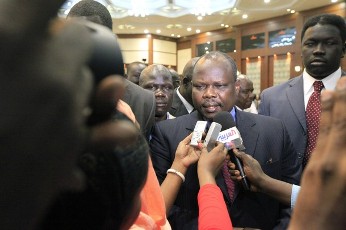Sudan’s oil fee demand forces South to consider new pipeline
September 1, 2011 (KHARTOUM) – Building an oil pipeline through Kenya to the Indian Ocean may be more cost effective than paying the transport and refinery fees demanded by North Sudan, a South Sudan official said Thursday.

Under a 2005 peace deal South Sudan shared its oil wealth 50-50 with Khartoum for six years. Since southern independence a new deal has been hard to come by. Sudan’s president has threatened to not allow South Sudan to use its infrastructure unless it pays $32 a barrel.
South Sudan, which began negotiations by offering less than half a dollar per barrel, says it will not accept customs fees above $7 per barrel for oil from new oil fields and $4 per barrel from existing ones.
At a mining industry conference in Australia, Pagan Amum a senior member of South Sudan’s ruling party told Reuters that the landlocked state was looking at “alternatives” to using the northern pipeline to Post Sudan on the Red Sea.
South Sudan’s long stated plan to build a pipeline through Kenya are years away from possible conclusion according to experts. Amum, the secretary general of the Sudan People’s Liberation Movement (SPLM), said he excepts that a deal between North and South Sudan would “be in the interests” of both countries.
Amum who has led the SPLM negotiating team, which has been meeting with their Khartoum counterparts in Addis Ababa, urged the Africa Union and other international mediators to encourage North Sudan to make “reasonable” demands in order to find a compromise.
Sudan’s two North-South civil wars (1955-1973 and 1983-2005) were over political representation, economic marginalisation, identity, religion and latterly oil, which was not discovered until the 70’s. The most recent conflict between South Sudan and various Khartoum governments killed around 2 million people, and was fought especially bitterly around the South’s oil fields.
Chinese and Indian companies dominate oil production in South Sudan but Amum said he hopes that South Sudan’s disassociation with Khartoum will allow more Western companies to invest and have a presence.
“There’s a lot of interest from companies from the Western world… the pariah nature of the Sudanese system made it politically and morally difficult or embarrassing for Western companies to be engaged,” Amum told Reuters.
The budget of the South Sudan government is almost totally reliant on oil. However, there are concerns over the social, environmental and health impact of oil production and exploration in the communities near, fledgling country’s oil fields.
A conference in December 2010 urged both Sudan and South Sudan to establish a fully-fledged audit system to cater for the oil industry’s socio-economic, environmental, and security impact after the South’s referendum on independence.
JONGLEI, UNITY DISCUSS OIL POLICY
South Sudan’s Unity state hosted Thursday a conference with neighbouring Jonglei state to assess the environmental impact the oil industry is having on communities and to suggest how to overcome such problems to oil companies and the government.
The minister for environment in oil-rich Unity state, William Gatjang Gieng, said the purpose of the conference was to ensure all communities in oil-producing states are being represented and their views are expressed to the government.
He said that affected communities in South Sudan should have an input into the policies of the ministry of petroleum. To enable this process oil task forces were established in 2009, with the backing of Norwegian People’s Aid (NPA), in Jonglei and Unity state.
Jonglei state’s delegation said that they hoped to learn from the experiences of Unity and Upper Nile before oil-production begins in their state. Solomon Pur, a member of Jonglei state task force, said the initiative will help communities, the government and oil companies to produce better policies.
Pur said that Jonglei hoped to learn the skills needed to be able to deal with oil companies when they start operating in the state.
Espom Loken, from Norway’s trade union for industry and energy workers, said that the challenges faced by South Sudan are similar to his country’s experience 40-50 years ago when they started producing oil.
(ST)

kuac Agol
Sudan’s oil fee demand forces South to consider new pipeline
Dear Southerners.
Building pipeline through Kenya to India Ocean could be cost effective but remember how much ransoms you would be able to pay to the piracy organisation base in the Ocean compare to the money pay to Port Sudan per Barrel for refinery and pipeline.
Please calculate the cost and start building the pipeline through that country you trust to be good in delivering the oil.
Remember also what had happened a year ago when something i don,t know was hijacked by someone who claimed that belong to kenya government and defined GOSS as general odinance supply and security ,could you remember that.
Your oil would again at the same situation.
Thanks
Wanibuluk Ciciliba
Sudan’s oil fee demand forces South to consider new pipeline
Kisangani in DRC is the best option and cost balanced and will liberate the South from the Economic slavery of the North Sudan.Not Kenya, Not Kenya….Piracy….Not Kenya…Theft…Not Kenya…Please…Kisangani… or Adis then…
Gabriel KK
Sudan’s oil fee demand forces South to consider new pipeline
You are right Kuac, Kenya can not be trusted with our oil safety and there are still some issues concerning the border between South Sudan and Kenya. we better watch out for whom to trade with and trust in the future.
Rising of the Sun
Sudan’s oil fee demand forces South to consider new pipeline
The fastest option is to facilitate overthrow of the NCP and put in power a friendly government in Khartoum.